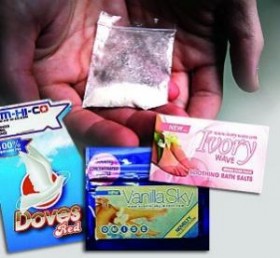Like other countries around the world, New Zealand has been grappling with the rise of the new synthetic drugs, such as the stimulant-type drugs known as “bath salts.” Unlike other countries around the world, including the United States, Kiwi lawmakers have responded not by attempting to ban them out of existence, but moving instead to regulate them.

“Bath salts” synthetic drugs (wikipedia.org)
“Regulating psychoactive substances will help protect the health of, and minimize harm to, individuals who use these substances,” said the Ministry of Health in support of the bill.
Passed on July 17 and put into effect the following day, the Psychoactive Substance Act of 2013 creates a new government agency, the Psychoactive Substances Regulatory Authority, to ensure that the new synthetics meet safety standards before going to market. The Authority is also charged with developing, implementing, and administering a licensing scheme for researchers, retailers, wholesalers, manufacturers, and importers.
That means that instead of sending in SWAT teams to bust underground synthetic drug labs, New Zealand will allow the drugs to be legally manufactured under strict regulations. But those seeking to manufacture them legally will have to demonstrate that they pose a low risk to consumers, including undergoing rigorous clinical trials to determine toxicity and addictiveness and subsequent approval by an independent expert advisory committee.
“Simply banning these drugs only incentivizes producers to develop drugs that get around the law — regardless of what they will do to the people that take them,” said Ross Bell, executive director of the New Zealand Drug Foundation. “This model incentivizes producers to develop drugs that are safer. We think that’s a much smarter way to go about it.”
Under the new law, regulations on the sale and purchase of the new synthetics immediately went into effect, including a ban on sales to people under 18, a ban on sales in convenience stores, and requirements for labeling and packaging, including mandatory health warnings.
“This represents a potentially transformative breakthrough in the legal regulation of drugs that typically have been criminalized with little forethought,” said Ethan Nadelmann, executive director of the US Drug Policy Alliance. “It pokes an important hole in the edifice of drug prohibition.”
Other countries may be interested in enlarging that hole, the Associated Press reported last week. It cited interest in the New Zealand model among Australian and British parliamentarians and quoted bill sponsor MP Peter Dunne as saying others were interested, too.
“The Hungarians, the Irish, the British, they’re all keen to know what we are up to,” he said. “It’s seen as cutting edge. They want to see how it works, and view it for their own country.”
Article republished from Stop the Drug War under Creative Commons Licensing









